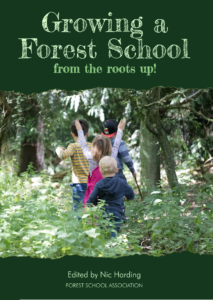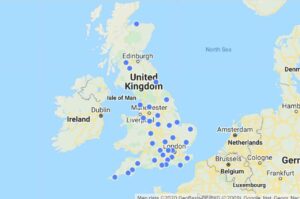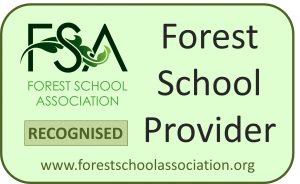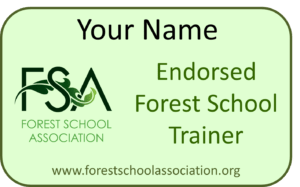Important lessons about the richness of the theoretical underpinnings of Forest School that
could inform our future …
By Sara Knight, October 2022
For those who don’t know me, I’m the FS leader that writes. And rabbits. I have delivered at least 20 workshops and 26 conferences speeches, 4 webinars, 7 peer reviewed papers, 12 book chapters, 5 books, 20 magazine articles, a masters dissertation, and a PhD, all on aspects of FS.
For my PhD by Prior Output, which I did during lockdown (like you do), I revisited some of my own publications from the last 10 years and the research that I undertook to create it within the context of the research and writings of others. A PhD has to make a unique contribution to a body of knowledge. In this instance, by looking back I have realised important lessons about the richness of the theoretical underpinnings of Forest School that could inform our future, and I would like to share some of them with you. Which is why this talk is called ‘Back to the Future’. Nothing to do with cars or sci-fi.
None of us would be here today if we didn’t think that everyone benefits from time spent at Forest School. But it is unlikely to be embraced by policy makers and educators across the UK without hard evidence of benefits based on a strong theoretical foundation. In fact there is plenty of evidence of the benefits of FS from 2003 onwards, if you don’t believe me just look at the publications listed in the history tent (to be imported to the FSA website)! It is not helped by some researchers calling what they are seeing FS when it isn’t, and some researchers not calling it FS when it is, particularly in the research that was done before the 6 Principles were agreed and promulgated. For example, I once asked Tim Waller why his paper, ‘The Trampoline Tree and the Swamp Monster with 18 Heads’ (2007) didn’t reference FS. He told me that the FS sessions he had seen involved the teachers telling the children what to do, rather than the session he was describing in his paper, which was all about child-led free play. So don’t rely on whether or not a paper or book has ‘FS’ in the title, read it and judge for yourself. Some researchers have indeed made some strong theoretical links (Harris, 2015; Waite & Goodenough, 2018; Pimlott-Wilson & Coates, 2019). So why aren’t the powers that be beating at our tent doors to integrate FS into the lived experience of as many of the population as possible?
In part it is to do with the nature of the research that we do and the nature of the ways in which policy is developed in the UK. I have experienced some of both, including contributing to a policy breakfast at the House of Commons, which was a singularly daunting experience, and debating with young researchers from the DoE, which was depressing in the extreme. Policy is, on the whole, developed quickly from easily-accessible data that supports the general trend of a particular government’s direction of travel. Anything that doesn’t conform to that direction of travel needs numbers. Lots of them. Which are typically found in the sciences where researchers largely but not exclusively undertake quantitative research (such as that by Richardson et al, 2020). And we don’t tend to do that. The closest I have come to it was my 2019 paper working with Graham Arnold who could convert our findings into the sorts of charts and graphs that those higher up the policy-making chain can glance at and gain a quick grasp of key facts. Which is all they are likely to do, before handing it to a less-important person to cook up into a paragraph in a white paper or county council policy document. Depressing but true, so we need to work with that reality if we want to change things.
However, if you read most of our research it is qualitative – case studies, records of projects, and ethnographies. A rich wealth of lived experiences meticulously charting the real rewards and progress made by individuals on their FS journeys. Stuff you have to read and digest, think about and appreciate, and usually done by recording the experiences of smaller numbers of participants. Not work easily counted like buttons, and not so many buttons if you can count them. This is why Nic has been slaving away to get an app developed to enable practitioners like all of you to capture the outcomes from your various and different sessions. That has the potential to capture some really big numbers! If we can extract tranches of data from that potentially rich store, then those FSA members who work in Universities or who are undertaking post-grad studies can set out the buttons and arrange them in pretty patterns, get them published in peer-reviewed journals, and in this way stand them up to scrutiny by the policy makers. That is not to advocate abandoning the aforementioned rich data, because that comes into play once the super tanker of state policy is turning. We need both, but we need the numbers first.
What else is missing, and what my thesis set out to do, was to present a coherent overview of relevant theoretical perspectives and synthesise them into a creditable theoretical framework.
One key to doing that is, I believe, interdisciplinarity. My computer doesn’t like that word, but I do. In my search for the complete theoretical framework for FS I have read work by academics and researchers from a wide range of disciplines: Philosophy, Education, Psychology, Health, Arts, Sociology, Theology and Biology all contribute valuable insights into why what we do works. I have explored their different and separate ideas in my writings, but I concluded that it is when these ideas are synthesised that ‘the whole is greater than the sum of the parts’, as Aristotle once said (Cohen, 2016).
By contrast, the papers I reviewed in my thesis create a multidisciplinary picture of FS, in that each views FS through a singular lens. That is a key point. A single disciplinary approach, such as that of a researcher only interested in, say, education, may well not see or may not value aspects of practice that an outdoor instructor would, and vice versa. In that way, the paper presented by the first researcher would laud the knowledge-based outcomes, the second would laud the building of team-working or the development of Bushcraft skills. Both might miss the psychological and biological value of attachment that can only come from an experience that takes place over time. Working in a multidisciplinary team is one stage better than that of a single perspective, but Burton and his colleagues (Burton et al, 2019) borrowed the term ‘convergence insufficiency’ from ophthalmic medicine to describe its limitations, and to propose a Complex Systems Theory in which collaborators from different disciplines undertake a process to align their values, structures, systems and rhythms of working before starting on a joint project. That alignment enables a true interdisciplinary sharing of understandings. It looks hard – and I haven’t tried it in practice yet. I can remember trying to work alongside a social worker when I was teaching in a school, and just aligning our rhythms of working was challenging! But if researchers could converge to research FS, the findings could create the most powerful and comprehensive evidence. Open minds doing holistic research sounds appropriate to researching our ways of working.
For example, Dewey (experiential outdoor learning), Piaget, Vygotsky & Bruner (education), Foucault (philosophy), and Hart (playwork), all say similar things about the benefits from people having agency over their own experiences. Similarly, mix up theories about attachment from E O Wilson (biology), Winnicott (early years), Harris (geography), Wattchow & Brown (outdoor adventure learning), Jung (psychology), and we find that humans and the planet are healthier if we feel an attachment to a natural place that in turn is a part of our self-identity. Examples spring to mind of native people’s attachments to place. Other themes that could be susceptible to such an approach could be the relevance of trees to human wellbeing, the role of play in personal development, the central importance of engagement with issues around sustainability, and the importance of nature connectedness.
In my head the theoretical picture of FS resembles that of the ‘Wood Wide Web’ (Wohlleben, 2017: 50), with the tree of FS being nourished by nutrients from a rich mycorrhizal network of interdisciplinary research and thought. This ‘gestalt’ image (Honderich, 1995) creates a more complete picture of FS and its place in the wider forest of outdoor learning.
I think it is important at this juncture to point out that all trees are lovely and all have their place. So it is that the other trees in the Outdoor Learning forest all have value and a role to play. When we first came together to form the national Forest School group in the early noughties we did so under the umbrella of the Institute for Outdoor Learning; we were the ‘Forest School Special Interest Group’, just one of many special interest groups. They are now called ‘Professional Communities’, and where those communities do not want or do not have the resources to become more independent in the way that the FSA has become, they are still there under that IOL umbrella. Which is where you will find the Nature Premium campaign. And indeed the FSA still contract the IOL to deliver some of our administrative tasks. Many FS leaders are also members of IOL, particularly those whose initial training was in other areas of outdoor learning. And there are overlaps – obviously with Bushcraft, but also with other trees in our forest. Just as trees can share mycorrhizal nutrients, so do we. So if you find that your practice aligns with a different tree in the forest, accept that and be proud of what you do. All the trees have a role, be they environmental education, field studies, Bushcraft, horticulture, Earth Education, or adventurous activities. But call it what it is, not FS.
Forest School adheres to the 6 Principles. If you haven’t got them tattooed on your soul, do so immediately. They represent the collective work of the FS community, the outcome of a huge project in 2010-12, when we worked together to decide what it is that we do in our sessions that enables us to deliver the outcomes, regardless of where we are and who we are working with. It was an extremely powerful bit of collective soul-searching by a community that had grown from the roots up with no imposed top-down definitions. The 6 Principles were not imposed, they were debated and agreed.
The bottom-up nature of Forest School is a great strength and should never be overlooked. I even found a theoretical expression for the way in which it created what we identify as Forest School from that original idea imported from Denmark to Somerset in 1993. It is social constructionism. Those of you who are early years trained will be familiar with social constructivism from studying Vygotsky and ideas about the more knowledgeable other, etc. That is where knowledge is socially constructed by more able others sharing, leading, instructing others consciously. Social constructionism is a more unconscious process, where gatherings of people who share the same goal unconsciously share knowledge and experiences, and make assumptions about how they align that become true through their debates, usage and practice. So when those of us who met together in the late 1990s and early noughties, we had all been interpreting FS in our own ways according to our prior knowledge and experiences. In those meetings, while we debated the national frameworks we wanted to achieve, at an unconscious level we were sharing and aligning our belief systems about FS. We made assumptions, and then made those assumptions a reality. And since then we have had conferences, regionally and nationally, that continues that process. More recently the process has been extended to webinars, and online fora. We come together, feel to a greater or lesser extent part of the same tribe, we overtly share knowledge, skills and stories, and covertly continue to shape and mould what FS is, and what the FSA is.
Recognising the importance of social constructionism and an interdisciplinary approach to research has informed my thinking about the origins and development of Forest School. FS has been co-constructed over twenty years by practitioners including myself into a new and identifiable way of working outdoors. Together we developed the Six Principles (Forest School Association, 2011) that underpin the delivery of Forest School; they capture the vision of FS and are still referenced and relevant today, see Coates and Pimlott-Wilson (2018), Arnold and Knight (2019). And we are getting tantalisingly close to being able to evidence that when all six principles are integrated into any FS setting, the outcomes are greater than in a comparable setting where one of more are not being adhered to. A quick overview gives clues as to why this is the case:
Exploring the disciplines of psychology, anthropology, biology, and human development will give clues as to how the Long Term principle is related to attachment and all the benefits that accrue from a secure sense of identity and belonging, and to brain changes, neural pathways that take time to mylanise and shape our patterns of behaviour. The whole area of attachment is endlessly fascinating to me, one I would like to research further. I feel I have only touched the surface of a well of fundamental truths.
Trained leaders, who have both the knowledge and the skills needed to work with their groups, have been through a rigorous process of equalising their skills – teachers learn about Bushcraft, forest rangers learn about human development, etc. And, like the driving test for a car, that is enough to make you safe in the woods. Ongoing CPD will expand your understanding and skill-set.
Whilst not wanting to exclude those who cannot get to work in deep forest, we acknowledge the spiritual and psychological power of the interaction between humans and trees. It is no coincidence that almost every faith on earth has a tree in its story somewhere. Fortunately, for the very young, even a small clump of trees is impressive.
The educational philosophers from Socrates through Pestalozzi, Dewey, Piaget, Vygotsky and Bruner, and the pioneers of Playwork such as Huizinga and our own Bob Hughes agree that person-centred processes create the best community for being, development and learning. The learning is much more likely to be holistic, rounded, and complete. Handing the locus of control to the participants is really effective, even if it requires conventionally-trained teachers and instructors to sit on their hands. Or better still, observe and when invited, participate. Closely allied to being person-centred is facilitating risk-taking, risks appropriate to the participants, the location and to the skills of the leader, but risks that will develop resilience and confidence.
The 6 Principles help synthesise pedagogical and practical approaches originating in different academic disciplines to create an interdisciplinary foundation for FS in the UK, wrapping round the different strands like the bark of the FS tree, keeping them safe and conjoined. This binding-together ensures the quality of FS delivery and thus the achievement of the identified outcomes.
In the last chapter of my thesis I drew conclusions about the importance of Forest School as an intervention for a modern multicultural society, post-Covid and in a climate emergency. Recent research (Canton, 2020) describes the emotional and cognitive benefits from engaging with a natural space over time. In a post-Covid world which is also dealing with a climate crisis, having a strong connection to nature will give FS participants a greater sense of wellbeing (Richardson, 2020) as well as more determination to act to preserve the planet. The need to promote pro-environmental behaviour by connecting people with nature is relevant both for their wellbeing and for the health of the planet (Hughes et al, 2019). FS practitioners embrace a nature connection that sees humans as a part of nature, not separate from it (Cree & Robb, 2021) addressing the problem of what Kahn called ‘environmental generational amnesia’ (Kahn, 2002). In addition, I view the purpose of education as about sustaining the individual, society and the planet, and FS is an effective way to do that.
This is closer to the world view of indigenous cultures who are more likely to recognise the deep interrelatedness of all life (Lent, 2021). And I won’t even touch on the socioeconomic pressures heading our way this winter. Lent (2021) is not alone in suggesting that the focus of modern society needs to be more on GNH (gross national happiness) and less on GNP (gross national product) (Van Norren, 2020). The World Happiness Report is issued annually by an offshoot of the United Nations. It consistently places the Scandinavian countries in the top 10 (Martela et al, 2020); in 2022 Finland came top followed by Denmark and then Iceland. This is where the roots of FS lie.
As I continue to engage with the FS community, I can see that the views of FS practitioners shape and modify FS when we meet together and share our values and ideas, which is consistent with social constructionism (Burr, 2015). We now have practitioners and trainers who do not remember a time before the 6 Principles, and our first trainees who experienced FS as children. But I celebrate my 70th birthday next year. How the social constructionism and interdisciplinary approach informs the continuing evolution of Forest School is now up to you.
References
Arnold, G. and Knight, S. (2019) ‘An Analysis of the Impact of Forest School Provision on Early Years Foundation Stage Outcomes using CASEY’ in Shelley, M. & Kiray, A., (Eds) (2019) Education Research Highlights in Mathematics, Science and Technology 2019. pp 211-221 https://www.isres.org/education-research-highlights-in-mathematics-science-and-technology-2019-11-b.html#.Xp2PhJl7mUk pp 211-221
Burr, V. (2015) Social Constructionism. 3rd Edn. Hove: Routledge
Burton, S., Hutchings, S., Lundy, C. and Lyons-Lewis, A. (2019) ‘Evaluating the Complexity of Service-Learning Practices: Lessons from and for Complex Systems Theory’. Journal of Higher Education Outreach and Engagement, Volume 23, Number 3, pp 89-103
Canton, J. (2020) The Oak Papers. Edinburgh: Canongate Books Ltd.
Coates, J. and Pimlott-Wilson, H. (2018) ‘Learning while Playing: Children’s Forest School experiences in the United Kingdom’, British Educational Research Journal, 45 (1), pp. 21-40.
Cohen, S. Marc, “Aristotle’s Metaphysics”, in E. Zalta (ed.) The Stanford Encyclopedia of Philosophy (Winter 2016 Edition), https://plato.stanford.edu/archives/win2016/entries/aristotle-metaphysics/ (Accessed 12th December 2021)
Cree, J. and Robb, M. (2021) The Essential Guide to Forest School and Nature Pedagogy. Abingdon: David Fulton
Harris, F. (2021) ‘Developing a relationship with nature and place: the potential role of forest school’, Environmental Education Research, 27(8), pp. 1214–1228.
Harris, F. (2017) ‘Outdoor learning spaces: The Case of Forest School’, AREA Journal, 50 (2). pp 222-231.
Harris, F. (2015) ‘The nature of learning at forest school: practitioners’ perspectives’
Education 3-13, 45 (2). pp 272-291.
Honderich, T. (1995) The Oxford Companion to Philosophy. Oxford: Oxford University Press
Hughes, J., Rogerson, M., Barton, J. and Bragg, R. (2019) ‘Age and Connection to Nature: when is engagement critical? Frontiers in Ecology and the Environment 2019. Vol 17 (5), pp 265-269
Kahn, P. Jr. (2002) ‘Children’s Affiliations with Nature: Structure, development, and the problem of environmental amnesia’, in Kahn, P. Jr and Kellert, S. (Eds.) ‘Children and Nature: psychological, sociological and evolutionary investigations’. London: The MIT Press. pp 93-116
Lent, J. (2021) The Web of Meaning. London: Profile Books Ltd
Martela, F., Greve, B., Rothstein, B. and Saari, J. (2020) ‘The Nordic Exceptionalism: What explains why the Nordic countries are constantly among the happiest in the world’ in Helliwell, J., Layard R., Sachs, J. and De Neve, J. eds. World Happiness Report 2020. New York: Sustainable Development Solutions Network. Retrieved from https://worldhappiness.report/ed/2020/ (accessed 10th November 2021)
Van Norren, D. (2020) ‘The Sustainable Development Goals viewed through Gross National Happiness, Ubuntu and Buen Vivir’. International Environmental Agreements: Politics, Law & Economics 20:431–458. (Accessed 11th November 2021)
Pimlott-Wilson, H. and Coates, J. (2019) ‘Rethinking learning? Challenging and accommodating neoliberal educational agenda in the integration of Forest School into mainstream educational settings’. The Geographical Journal. 2019; 185 (3) pp. 268–278
Richardson, M. (2020) ‘Beyond Restoration: Considering Emotion Regulation in Natural Well-being’. Ecopsychology Journal, 11 (2), pp. 123-129
Richardson, M., Dobson, J., Abson, D.J., Lumber, R., Hunt, A., Young, R. and B. Moorhouse. (2020) ‘Applying the pathways to nature connectedness at a societal scale: a leverage points perspective’, Ecosystems and People, 16:1, 387-401,
Waite, S. and Goodenough, A. (2018) ‘What is different about Forest School? Creating a space for an alternative pedagogy in England’. Journal of Outdoor and Environmental Education, 21. pp. 25–44
Waller, T. (2007) ‘The Trampoline Tree and the Swamp Monster with 18 heads: outdoor play in the Foundation Stage and Foundation Phase’, Education 3-13, 35 (4), pp. 393— 407.
Wohlleben, P. (2017) The Hidden Life of Trees – What They Feel, How They Communicate: Discoveries from a Secret World. London: Harper Collins




